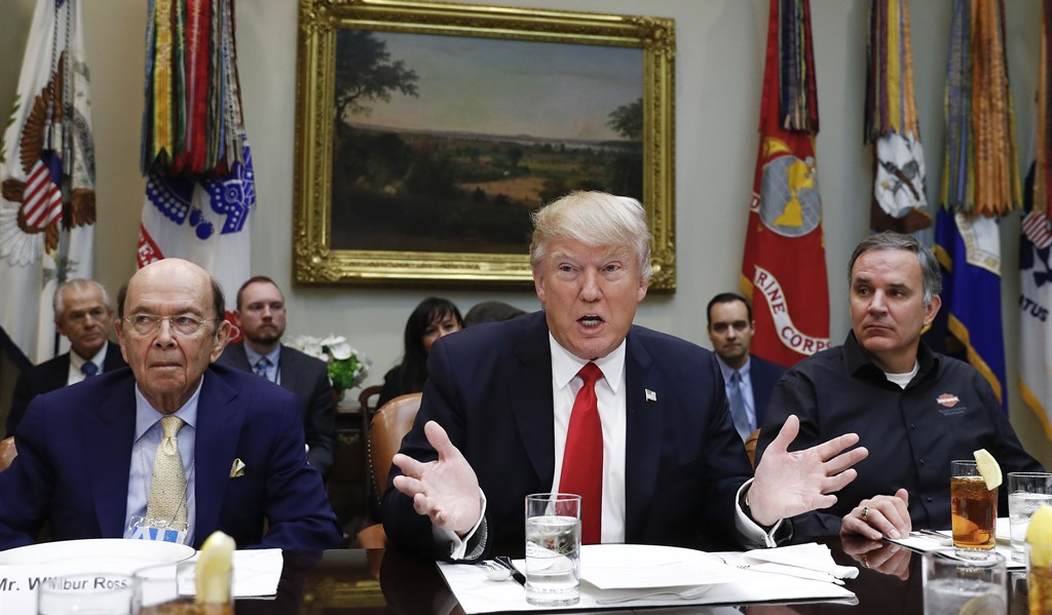Via NTK and Powerline, a memorably awkward moment from yesterday’s Fourth Circuit hearing on the travel-ban order. Alan Dershowitz warned of this bizarre scenario, in which the same executive order might be constitutional or unconstitutional depending purely on which president signed it, when Trump’s revised travel ban was blocked by two federal judges in March. The order was discriminatory, the courts reasoned, not so much because of what it said but because of what Trump said when he was a candidate. He had talked about discriminating against people based on faith (e.g., a temporary worldwide ban on Muslims from entering the U.S.), therefore it was safe to presume that his travel ban had a discriminatory motive even though it applied only to a small number of Muslim countries. By that logic, Barack Obama or Hillary Clinton could have signed the same order, word for word, and it probably would have been upheld as constitutional, accorded the usual benefit of the doubt the president receives from courts on national security matters.
By looking past the text of the order to statements outside the record, courts are setting themselves up for eye-crossing exercises in divining purpose. How should a judge weigh Trump’s since-abandoned proposal of a Muslim ban (which has now been scrubbed from his campaign website) against him telling a crowd, “I love the Muslims. I think they’re great people,” and claiming he’d have no problem appointing a Muslim to a cabinet position? Is there a time limit on how far back into the past you can reach to try to decipher his motives? For instance, is something he said the day before he announced his candidacy out of bounds whereas something he said the day after fair game for judges to consider? Should statements made by other people, like Rudy Giuliani or Stephen Miller, be taken into account in deducing the executive branch’s motives? Most importantly, if Trump is guilty of a discriminatory motive, how does he “cure” that for constitutional purposes so that his travel ban can pass court scrutiny? Does he need to give a “Muslims are awesome” speech? Formally apologize for the Muslim-ban idea from the campaign? The Fourth Circuit didn’t know what to make of all this yesterday:
Judge Robert B. King suggested that judges could not ignore Mr. Trump’s statements and motives. “He’s never repudiated what he said about the Muslim ban,” Judge King said of the president.
But Judge Paul V. Niemeyer said Mr. Trump’s official actions should not be assessed based on his earlier statements. “Can we look at his college speeches?” Judge Niemeyer asked. “How about his speeches to businessmen 20 years ago?”
Jeffrey B. Wall, the acting United States solicitor general, said the court should not look behind the revised executive order to assess Mr. Trump’s motives. Most of Mr. Trump’s statements were made before he took the oath of office, formed a government and took advice from cabinet officials. “Candidates talk about things on the campaign trail all the time,” Mr. Wall said.
Remember, Trump tried to make his revised travel-ban order more acceptable to the courts by removing some elements from the original EO. He lifted the indefinite ban on Syrian refugees, dropped Iraq entirely from the list of seven countries subject to a 90-day freeze on visitors, and struck the language that would have given preference to religious minorities from the region in admission to the U.S. Didn’t matter. That order was blocked too because, apparently, Trump’s impure motives from the campaign are uncurable. In theory, with this as precedent, a judge who dislikes an executive policy could block it if he can find anything discriminatory that the president, his deputies, or even his “associates” like Giuliani, who has no role in the government, have said on the subject years before.
Exit question: If courts are worried that the ban will be applied in a discriminatory way, why not let it go into effect and deal with those “discriminatory as applied” challenges as they happen, if they happen?







Join the conversation as a VIP Member